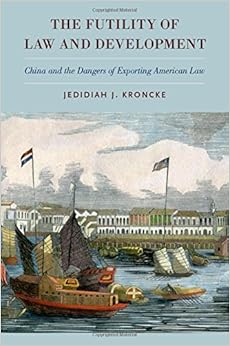Via Jotwell, we have word of a new release from Oxford University Press:
The Futility of Law and Development: China and the Dangers of Exporting American Law (2015), by
Jedidiah Kroncke (FGV Direito SP). Here's the description from the Press:
For all the attention paid to the Founder Fathers in contemporary
American debates, it has almost been wholly forgotten how deeply they
embraced an ambitious and intellectually profound valuation of foreign
legal experience. Jedidiah Kroncke uses the Founders' serious engagement
with, and often admiration for, Chinese law in the Revolutionary era to
begin his history of how America lost this Founding commitment to legal
cosmopolitanism and developed a contemporary legal culture both
parochial in its resistance to engaging foreign legal experience and
universalist in its messianic desire to export American law abroad.
Kroncke reveals how the under-appreciated, but central role of
Sino-American relations in this decline over two centuries,
significantly reshaped in the early 20th century as American
lawyer-missionaries helped inspire the first modern projects of American
humanitarian internationalism through legal development. Often
forgotten today after the rise of the Chinese Communist Party in 1949,
the Sino-American relationship in the early 20th century was a key
crucible for articulating this vision as Americans first imagined waves
of Americanization abroad in the wake of China's 1911 Republican
revolution.
Drawing in historical threads from religious, legal
and foreign policy work, the book demonstrates how American comparative
law ultimately became a marginalized practice in this process. The
marginalization belies its central place in earlier eras of American
political and legal reform. In doing so, the book reveals how the
cosmopolitan dynamism so prevalent at the Founding is a lost virtue that
today comprises a serious challenge to American legal culture and its
capacity for legal innovation in the face of an increasingly competitive
and multi-polar 21st century. Once again, America's relationship with
China presents a critical opportunity to recapture this lost virtue and
stimulate the searching cosmopolitanism that helped forge the original
foundations of American democracy.
And a few blurbs:
"Kroncke recovers a wide-ranging legal cosmopolitanism as the least
appreciated, if not outright ignored, of our Founders' shared
commitments. Using transnational sources wholly unappreciated to date,
he artfully reveals through the Sino-American relationship how this
virtue was lost through interwoven transformations in American legal,
religious, and diplomatic history. A work whose lessons need by heeded
by all those concerned with preserving American law's historical
vibrancy in the contemporary era, or with how we conceive of America's
role in the international world." -- William E. Nelson
"Americans
keep hoping that projects to export our law will be the key to spurring
economic growth and liberal rights in developing countries. The
projects keep failing, yet the hope always revives. Kroncke's brilliant
exploration of two centuries of American lawyers' engagement with China
helps to explain why: the missionary-lawyers are the direct secularized
heirs of lawyer-missionaries, just as confident in the universal
validity of their models and impervious to the true lessons of their
experiences. He recovers a time when a more cosmopolitan America was
willing to learn from other societies, even while aspiring to be an
exemplar of republican democracy." -- Robert Gordon
The JOTWELL review, by
Aziz Rana (Cornell Law School), is available
here.
